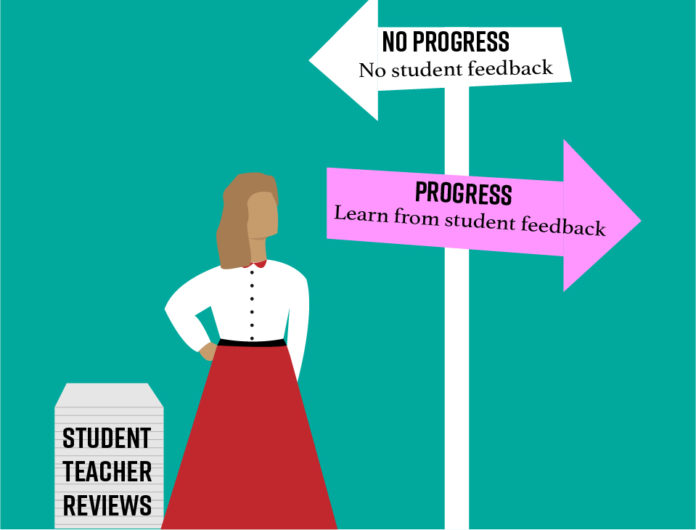It’s that time of the year — along with finals, projects and last-minute assignments, students are able to partake in one of the semester’s most loved and equally dreaded activities: course evaluations.
These evaluations allow students to rate the quality of their professors, courses and overall semester academic experience. Some questions are asked on a scale, with students ranking categories from a one to a five. Others are more open-ended and allow for comments about ways teachers or courses created a successful learning environment or can be improved.
The system allows students to comment on how much they enjoyed their favorite courses and professors while also having an outlet to express ways that other aspects of their academic experience could be improved upon.
Constructive criticism on a class or professor is helpful when done tastefully, but expressing disapproval can often cross a dangerous line.
Giving reasons for not enjoying a class is OK. Writing about specific ways a course could be improved for the future is OK. Even describing specific instances a professor was disrespectful to students is OK. What is not OK, however, is using course evaluations as a chance to make petty comments or rant about your complaints.
When writing about a course or professor you didn’t enjoy, be specific. Avoid generalizations or using extreme words like “terrible” or “the worst.” Instead, provide specific examples of ways that you felt a situation was unfair or wrong.
Another important consideration to keep in mind is to not complete course evaluations when you are angry. Instead of completing them with your friends who also don’t enjoy a certain class or at a moment you feel particularly hurt, wait for your emotions to die down and consider whether what you are saying is accurate and fair — not an exaggeration or a way to get revenge on a professor. Those reading course evaluations will likely not take a claim seriously if it is filled with extreme wording and has an angry tone.
Also, consider why you are making negative comments on a course evaluation. Ask yourself whether your bad review is simply over-personal resentment about a grade or because a professor doesn’t cater to your specific learning style.
Additionally, don’t let course evaluations be the only time you express frustration or disapproval about a course. Instead of letting it all out on course evaluations at the end of the semester, try speaking to your professor one-on-one first to gain understanding as to why they behaved a certain way or chose a certain method of teaching. This can often be more insightful and more fulfilling than only sending negative comments through evaluations.
That being said, however, it’s incredibly important to complete course evaluations regardless of whether your views of a course were positive or negative. The reviews are read and taken into consideration by faculty and departments and can cause change regarding how courses are taught and how they can best create a positive learning environment for students. Always complete evaluations — they allow real change to be made and for your voice to be heard.
Just think twice before immediately sending negative comments, and consider whether your evaluation is just a reflection of your immediate emotions or feedback that could improve the course for future students.






